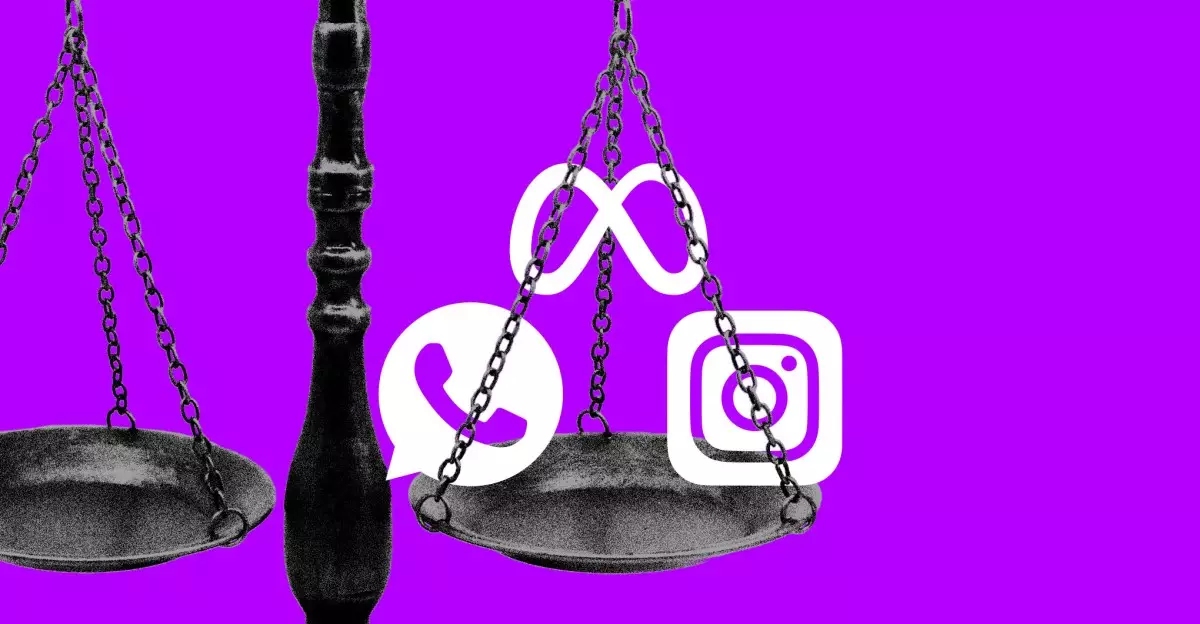In an era defined by rapid technological advancement and mounting regulatory scrutiny, the trial between the Federal Trade Commission (FTC) and Meta Platforms, Inc. presents a pivotal moment for the tech industry. As CEO Mark Zuckerberg took the witness stand, critical questions emerged, particularly concerning the strategic purchases of social media giants WhatsApp and Instagram. Under the watchful eye of a Washington, DC courtroom, the proceedings dug deep into the intent behind these acquisitions, revealing not just a business narrative but the philosophical underpinnings of Zuckerberg’s vision for the future of communication.
This trial, initiated by the U.S. government’s antitrust lawsuit, seeks to unravel whether Zuckerberg’s purchases were driven by genuine intent to enhance user connectivity or a calculated effort to eliminate competition. With significant financial resources at stake—WhatsApp purchased for an eye-watering $19 billion in 2014—Zuckerberg’s testimony comes not only as a defense of his strategies but as a manifestation of 21st-century corporate warfare.
A Grin Amidst Concerns: Zuckerberg’s Nonchalant Defense
One striking moment during the proceedings illustrated Zuckerberg’s attitude toward these acquisitions when he confidently remarked, “I’d do it again,” glowing with pride over his WhatsApp investment. This encapsulates his unshakeable belief in the shift of digital communication and the direction it should take. Despite the stakes at hand, Zuckerberg depicted a compelling narrative where he viewed his acquisitions as strategic moves to adapt to transforming communication modes—specifically, a transition from public forums to private messaging.
However, his assertions raised eyebrows. Was his conviction a genuine reflection of optimism in a technology-driven future, or an elaborate ruse to sidestep the accusations laid out by the FTC? The government claims that these purchases reflected a maneuver designed to stifle competition, and Zuckerberg’s nonchalant retelling belied a more complicated narrative of an industry frequently challenged by its shortcomings and ethical dilemmas.
Private Messaging: Embracing Change or Stifling Innovation?
Reflecting on the tantalizing prospect of competitive threats, Zuckerberg’s defense hinged on his understanding of WhatsApp and Instagram as unique entities, unencumbered by the ambitions typically seen in social media ventures. He argued that WhatsApp’s original founders demonstrated significant disdain for traditional social networking paradigms, allowing Zuckerberg to assert that he intended to cultivate rather than extinguish these platforms. The complexity of this narrative invites scrutiny over whether this mindset fostered genuine innovation or stifled it through excessive centralization.
His forward-looking assertion that WhatsApp would serve as leverage against tech giants like Apple and Google shines a light on the precarious balancing act played by digital monopolies. As Zuckerberg pointed out, this acquisition was not merely about incorporating another platform; it was a strategic block aimed at retaining control over shifting digital landscapes. But therein lies the controversy: can the quest for dominance justify the eradication of competitive innovation?
Instagram: An Opportunity or a Threat?
In the saga of Instagram’s acquisition, Zuckerberg’s testimony illustrated a nuanced understanding of competition. Initially, he claimed Ambassadorial sentiments toward Instagram until it amassed a significant user base, prompting concerns over engagement siphoning from Facebook. This shift in perception marks a troubling trajectory—transitioning from promoting competition to utilizing acquisition as a means of control.
Zuckerberg’s decisions post-acquisition indicate a desire to monopolize the social media ecosystem rather than encourage healthy competition among diverse players. His directive to the Instagram team to pivot away from integrations with Facebook underscores a broader unease within Meta’s corridors regarding user engagement and market stability. Admittedly, this could be seen as a tactical move to harness Instagram’s potential while preventing its meteoric rise from overshadowing Facebook’s dominance.
Reality Check: Reflecting on Visions and Miscalculations
As the trial progresses, an internal struggle becomes evident, not just for Zuckerberg but for the entirety of the tech industry grappling with the fine line between ambition and monopolization. The revelations from both Zuckerberg and former Meta COO Sheryl Sandberg bring to the forefront the complex realities of corporate negotiations, with Sandberg admitting to an earlier misjudgment regarding the valuation of Instagram, illustrating that even high-level executives often grapple with uncertainty.
This dichotomy—between foresight and miscalculation—challenges the simplistic categorization of corporate strategies as either altruistic or self-serving. The blurred boundaries of innovation reflect broader ethical considerations within the tech ecosystem, provoking difficult questions around the appropriateness of acquisition strategies aimed at prolonging corporate longevity at the potential cost of consumer choice.
As this landmark trial unfolds, it forces us to reckon with the implications of such influential corporate maneuvers. What does it mean for competition and innovation in tech when acquisition rather than rivalry reigns supreme? The answers might shape not just Zuckerberg’s legacy but the future landscape of digital interaction for generations to come.

